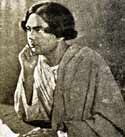|
| Home | History Of Nazrul | The Rebel Poet |
 | The Rebel Poet |  Nazrul was a revolutionary like the great Tamil poet Subramania Bharthi. Both suffered from their revolutionary beliefs. Nazrul saw the end of British rule in India when the thought of an independent India was a mid-summer dream. Nazrul was a revolutionary like the great Tamil poet Subramania Bharthi. Both suffered from their revolutionary beliefs. Nazrul saw the end of British rule in India when the thought of an independent India was a mid-summer dream.
He had great admiration for Mahatma Gandhi, writing "The Song of the Spinning Wheel." He did not however believe that spinning wheels alone would bring independence. His songs were used to open major Conferences, and most importantly, the All India Congress Conference, later publishing the Party pamphlet.
His loud voice of protest signified a departure from traditional Bengali literacy.
| "I am the rebel eternal" | wrote Nazrul in his most widely known poem: Vidrohi (The Rebel), and it is this spirit of rebellion that lies at the heart of his poetry and song. Bondage and slavery inflamed his inner feelings, finding expression in his works, but was repressed savagely by the colonial government. He was imprisoned for sedition by the British and many of his books were banned.
Nazrul had enormous self-confidence and conviction in the justness of his cause, but was not unaware of his weaknesses. He was not however apologetic, and expressed this in verse as: | "I am poet of the present, and not a prophet of the future!"
"At the turn of the century I may survive: I may not - but I should not care"
"I have turned mad having seen what I have seen,
having heard what I have heard.
Therefore, I say whatever occurs to me." | Great artists are international: Shakespeare, Goethe, Tolstoy, Tagore and Nazrul belong to no particular country, race or society, but to the whole world. Nazrul has left a legacy that will be enjoyed and should be honoured for generations of all cultures to come. | |
|
|